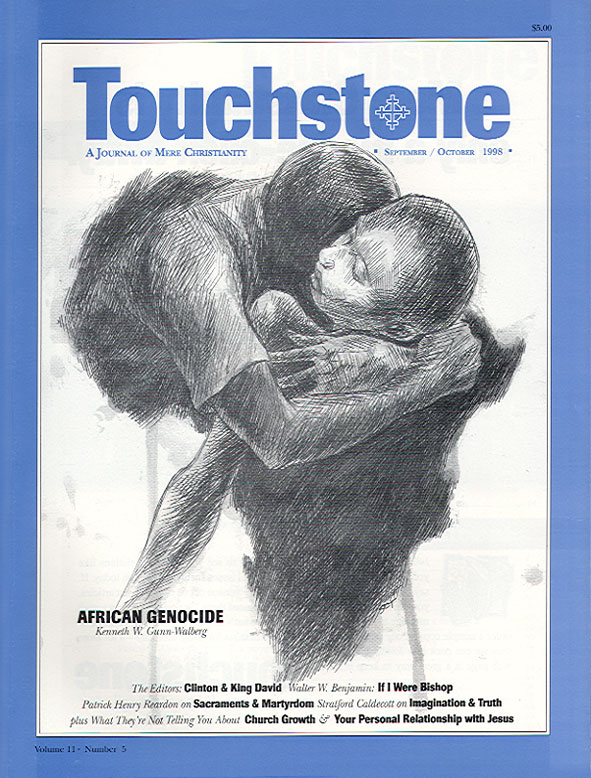Is a Personal Relationship with Jesus What I Really Want?
Peter Toon on the Theology of Salvation
Many people believe that the essence of Christianity is “a personal relationship with Jesus” (or “the Lord Jesus Christ”). Conversion is seen as entering into such an arrangement, and the Christian life is felt to be the experience of this relationship.
Such a way of speaking seems to be so sincere and so meaningful that few question its authenticity. Thus it has been granted a kind of orthodoxy by Christians of various backgrounds and theological traditions. “A personal relationship with Jesus” has become a standard form of expression for conservatives and liberals alike.
Few of those who encourage the use of this descriptive expression seem to realize that it is found neither in the Bible nor in classic theology. It is relatively recent and owes its origin and popularity to particular developments in Western culture—individualism, for example. Within evangelicalism, it is usually part of a popular theology that, claiming to be straight from the Bible, emphasizes that “God loves you as an individual” and that “Jesus Christ died for you as an individual” and that, therefore, “you as an individual can have a personal relationship with God or Jesus.” When a model of “a personal relationship with Jesus” is sought in the New Testament then, one is pointed to the disciples who followed Jesus in Galilee and Judea or the disciples who met with the risen Lord Jesus in the forty days before his Ascension.
In the New Testament, baptized Christians are described as being in the family of God as adopted children, within the Body of Christ as members and under Christ the Head, as branches of the vine whose trunk is Jesus Christ, as sheep following the Shepherd, as travelers in or on the Way to the Father, as members of the royal priesthood, as soldiers in the army of the Lord, and via many other images. They are called to be the salt of the earth and the light of the world, and they are to adorn and commend the gospel by what they are, what they do, and what they say.
Certainly the call to become a Christian is addressed by the Father through the Lord Jesus Christ and by the Spirit (in the preaching of the gospel) to each person, for God loves the whole world. Further, the response to this call in repentance and faith is personal, made individually by each believer. Then, also, the gift of the indwelling Spirit who comes to live in the soul is a gift to a real person, which he individually experiences, for “the Spirit bears witness with my spirit that I am a child of God.” Christianity certainly involves and includes an encounter with the Holy Trinity by each Christian. It is personal and experiential.
However, the act of personal decision and commitment to the Father through the Son is only possible because of the invisible and secret activity of the Holy Spirit within the mind, heart, and will. It is the Spirit of the Father and of the Son who unites the repentant believer to the Father through the Son for forgiveness, salvation, and eternal life. And it is the same Holy Spirit who places the new Christian in the Body of Christ, the family of God, and the royal priesthood as he brings that person into union with Jesus Christ, Lord and Savior. Therefore, there is never an individualistic union of a believer with God. The fellowship, union, and communion are truly personal and very real (as the saints testify), but are always also together with all others who are in Christ Jesus by faith and love with the Holy Spirit.
It is not within the power and capabilities of any human being to place himself in friendship with God or in communion with the Holy Trinity. The Bible speaks of God establishing his covenant with man. The Lord Jesus Christ established the new covenant by the shedding of his blood—his propitiatory and expiatory sacrifice of himself on the cross. Only when God has established his covenant of grace is it possible for people to enter into it. So this action is not to be seen merely as God taking the initiative and man responding, as if it were a contract between a major and a minor partner. It is the Holy Trinity actually establishing the way and the means for sinful human beings to be reconciled with their Creator and Judge and brought into the fullness of life everlasting.
Through and in Jesus Christ, and by the Holy Spirit, God the Father created and maintains a gracious relation with the human race. This is his covenant of grace. It is all of mercy, for even the response of sinners to the invitation of the gospel is by the assistance and power of the Holy Spirit. Certainly, the acts of repenting and believing and confessing and obeying and trusting and loving are the acts of free human persons, but the freedom to act is only possible through the presence and assistance of the Holy Spirit, who indwells the soul and quickens the faculties.
A careful reading of the classic Book of Common Prayer (1928 in the United States) and of the other Anglican formularies (the Ordinal, the Thirty-nine Articles) will confirm that sinful human beings can only have fellowship with the Holy Trinity because the same Holy Trinity has established a covenant and created a relation with mankind through the new Man (Adam). This covenant and relation has its center and its meaning in the Lord Jesus Christ, the new Adam, who is the Word made flesh and the Mediator and the High Priest.
In the Common Prayer tradition, the Collect for the Nineteenth Sunday after Trinity reads:
subscription options
Order
Print/Online Subscription
Get six issues (one year) of Touchstone PLUS full online access including pdf downloads for only $39.95. That's only $3.34 per month!
Order
Online Only
Subscription
Get a one-year full-access subscription to the Touchstone online archives for only $19.95. That's only $1.66 per month!
bulk subscriptions
Order Touchstone subscriptions in bulk and save $10 per sub! Each subscription includes 6 issues of Touchstone plus full online access to touchstonemag.com—including archives, videos, and pdf downloads of recent issues for only $29.95 each! Great for churches or study groups.
Transactions will be processed on a secure server.
more from the online archives

23.6—November/December 2010
Darwin, Design & Thomas Aquinas
The Mythical Conflict Between Thomism & Intelligent Design by Logan Paul Gage
calling all readers
Please Donate
"There are magazines worth reading but few worth saving . . . Touchstone is just such a magazine."
—Alice von Hildebrand"Here we do not concede one square millimeter of territory to falsehood, folly, contemporary sentimentality, or fashion. We speak the truth, and let God be our judge. . . . Touchstone is the one committedly Christian conservative journal."
Support Touchstone
—Anthony Esolen, Touchstone senior editor








